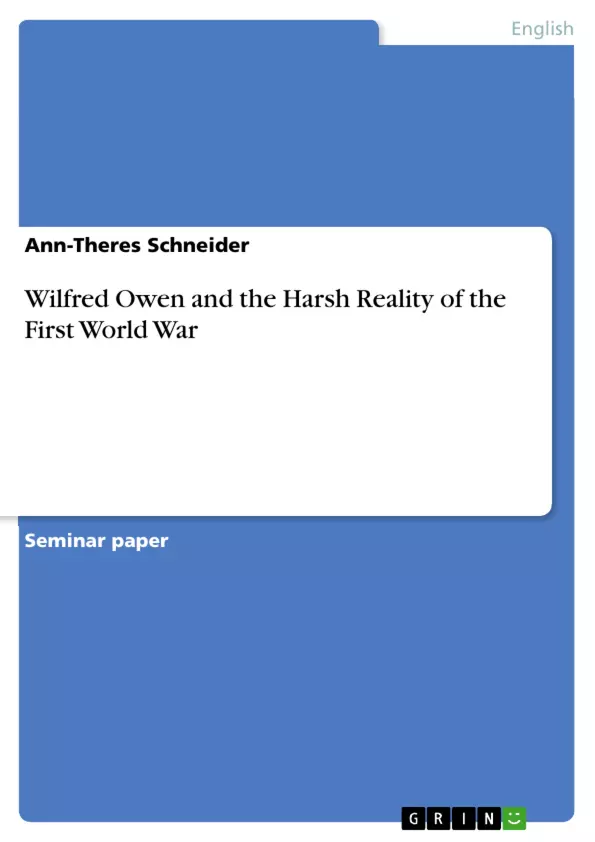This term paper will deal with the poetry in the First World War. Particular attention will be paid to the British war poet Wilfred Owen. Wilfred Owen (1893-1918) wrote many poems to process experiences he made while fighting in the trenches. Most of his poems were published posthumously.
In the first part of the term paper, some characteristics of English poetry from the Great War will be identified. At that time, the so-called Georgian movement was distinguished. Consequently, in the second part the main aspects of this movement will be clarified, and it will be shown how Owen was influenced by the Georgians. In the third part, some details about Wilfred Owen and his short but excellent poetic career will be given. Poems of Wilfred Owen will be analysed regarding how he conveys the harsh reality of war in his poems, and his attitude towards war. Owen was one of the persons who were diagnosed with the so called ‘shell shock’. Therefore, his mental illness and being part of the war had a significant impact on his poems. Siegfried Sassoon (1886-1967), another well-known English war poet, had a huge influence on the writings of Owen, too. They met at hospital to recover from shell shock. That is why there will be references to Sassoon in the term paper.
The overall results will be summed up in a conclusion. The question(s) from the beginning will be answered and there will be a short view on potential future research topics.
Table of Contents
- Introduction
- Great War Poetry
- Georgian Movement
- Wilfred Owen
- Details About His Life
- Analysis of Poems Written by Owen
- Content
- Language and Structure
- Conclusion
- Appendix
- Dulce et Decorum Est BY WILFRED OWEN
- Strange Meeting BY WILFRED OWEN
- Exposure BY WILFRED OWEN
- Anthem for Doomed Youth BY WILFRED OWEN
Objectives and Key Themes
This paper aims to analyze the poetry written during the First World War, focusing on the work of Wilfred Owen. It will explore the impact of the war on poetry, examining how poets responded to the atrocities and the experiences of the "normal" soldier. The paper will specifically explore the themes of:- The impact of the First World War on the development of poetry
- The relationship between the Georgian Movement and Wilfred Owen's poetry
- Wilfred Owen's personal experiences and their influence on his poetry
- The harsh realities of war as conveyed in Owen's poems
- The influence of other war poets, particularly Siegfried Sassoon, on Owen's work
Chapter Summaries
- Introduction: The introduction sets the context for the paper, discussing the significance of the First World War and the development of a unique type of war poetry. The paper's focus on Wilfred Owen and his experiences in the trenches is introduced.
- Great War Poetry: This chapter explores the broader context of war poetry during the First World War, highlighting the use of poetry for propaganda and the emergence of "trench poets" who documented their experiences. The chapter examines the characteristics of war poetry and its potential for both representing the misery of war and making it beautiful.
- Georgian Movement: This chapter introduces the Georgian movement, highlighting its influence on Wilfred Owen. The chapter discusses the characteristics of Georgian poetry, including its focus on reality, its use of simple language, and its expression of feelings. It examines how Owen's poetry reflects the influences of the movement.
- Wilfred Owen: This chapter provides details about Wilfred Owen's life, highlighting his early interest in writing and his experience in the First World War. The chapter also discusses Owen's relationship with his mother and the influence of evangelical Christianity on his work.
- Analysis of Poems Written by Owen: This chapter explores the content and structure of Owen's poetry, analyzing how he conveyed the harsh realities of war. The chapter examines how his personal experiences and mental illness impacted his poetry, as well as the influence of other war poets, particularly Siegfried Sassoon.
Keywords
The main keywords and focus topics of this paper include: First World War poetry, trench poetry, Georgian movement, Wilfred Owen, Siegfried Sassoon, war experiences, shell shock, anti-war poetry, the harsh reality of war.Frequently Asked Questions
Who was Wilfred Owen?
Wilfred Owen (1893-1918) was a prominent British war poet known for his realistic and harrowing depictions of trench warfare during the First World War.
What is the "Georgian movement" in poetry?
The Georgian movement was a poetic trend influenced by reality, simple language, and the expression of genuine feelings, which significantly impacted Owen's early writing style.
What role did "shell shock" play in Wilfred Owen's work?
Owen was diagnosed with shell shock (PTSD). His mental illness and his recovery in the hospital deeply influenced the emotional depth and raw honesty of his war poetry.
How did Siegfried Sassoon influence Wilfred Owen?
The two poets met in a hospital while recovering from war trauma. Sassoon encouraged Owen to use his experiences to create powerful, anti-war poetry, serving as a mentor and friend.
Which famous poems by Owen are analyzed in this paper?
The paper analyzes classic works including "Dulce et Decorum Est," "Strange Meeting," "Exposure," and "Anthem for Doomed Youth."
What is the central theme of Owen's poetry?
The central theme is the "harsh reality of war," contrasting the romanticized view of combat with the actual misery, physical suffering, and psychological trauma of soldiers.
- Quote paper
- Ann-Theres Schneider (Author), Wilfred Owen and the Harsh Reality of the First World War, Munich, GRIN Verlag, https://www.grin.com/document/1264826



